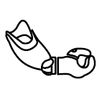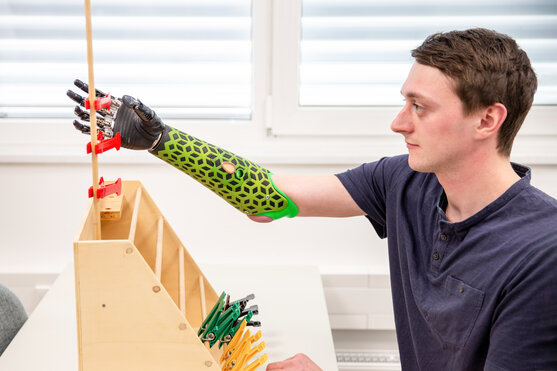A myoelectrically controlled arm prosthesis restores various natural functions to your hand. The electronic hand can perform different types of grips.
In the case of the passive arm prosthesis (also known as cosmetic prosthesis), external appearance is the priority.

The FIRST prosthesis is an arm prosthesis for small children and has various interchangeable attachments.
Hand and partial hand prostheses are divided into passive, myoelectrically controlled, and work prostheses.
A silicone finger prosthesis realistically recreates the missing finger.
A functional aid is an individual hand or arm tool that makes it easier for you to perform a specific activity (e.g. eating, cycling, etc.).

Master everyday life with a prosthesis
What works best for me?
We would like to confidently stand by you on your prosthetic journey. It is important to us to show you what opportunities and possibilities you have with dysmelia or amputation. A modern, customized prosthesis can give you a high degree of mobility and independence. You’ll see how well you master your life – everyday living, hobbies, school and work – with a prosthesis!
Your personal preferences and goals will determine the type of prosthesis you will have. We build everything: from robust work prostheses to cosmetically sophisticated variants and myoelectrically controlled hand and arm prostheses.
Here is an overview of the typical procedure for prosthesis treatment at Pohlig.
Learn more about the different amputation levels on the upper extremities!
Make an appointment over the phone or send us a message!
How expensive is a prosthesis?
Costs and reimbursement
How much does a prosthesis cost?
The cost of a prosthesis depends on several factors. One important factor is the amputation level: will the prosthesis be replacing a finger, a hand or the entire arm? The more components needed to build the prosthesis, the more it will cost.
Additionally, different types of prostheses exist for each amputation level, and the costs can differ considerably. Examples include:
- cosmetic prostheses
- myoelectrically controlled prostheses
- self-powered prostheses
- hybrid prostheses
For a concrete price, it is best to contact us directly – we will be happy to provide you with precise information.
What costs do health insurance companies cover?
It is possible that your health insurance will cover the costs of your prosthesis however this is determined on a case-by-case basis.
If you are covered by public health insurance, your health insurance company first requires a doctor’s prescription and a cost estimate. As soon as we receive your prescription, we will send both documents to the respective health insurance company. It takes some time before we get either an approval or a rejection notice.
Many wonder whether the health insurance company covers every kind of prosthesis or only those with the most basic features. Generally speaking, after an individual examination, your health insurance company covers the costs for the services that you as a patient actually need. The health insurance company will not pay for services that are not included in the catalogue of services of the respective health insurance company.
If you have private health insurance, the scope of the reimbursement of costs is determined individually according to your contractual agreements.
For statutory and private insured persons, the following applies: If the health insurance company refuses the claim for reimbursement, it is possible to take legal action and file an objection.
Our physiotherapists are trained, certified and specialized in prosthetic rehabilitation. Our strengths are user training and targeted training, such as how to use a myoelectric arm prosthesis. In close cooperation with the orthopedic technician, our therapists address your personal needs and goals.
With its gestures, motor skills and sensory properties, the hand is one of the most complex organs. When it comes to replacing fingers, hands, or the entire arm with a prosthesis, professional competence is critical.
In order to offer you the highest level of individualized care, we align ourselves with the quality guidelines according to VQSA (Verein zur Qualitätssicherung in der Armprosthetik e.V. [Association for quality assurance in arm prosthetics]). They define the requirements of how state-of-the-art prosthetic treatment of the upper extremities is to be guaranteed.

Prostheses for finger, hand, and arm
How is a prosthesis composed?
Finger, hand, arm and shoulder prostheses are made up of different components. These are individually adapted to your needs and requirements.
Depending on the amputation level, various industrially manufactured fitting parts are attached to the socket. Here you can get an overview of the possible components of a prosthesis.
Learning to handle the prosthesis
Prosthetic training
The use of a prosthesis must first be learned - especially if you are being fitted with an arm prosthesis for the first time. Putting on and taking off the prosthesis, tensing the respective muscle group to control the electric hand or the movements to operate the traction bandage must be trained. It will take some practice before you are able to use the various grips.
During the prosthetic training, you will learn how to use your prosthesis correctly. If you have any questions in this regard, you can contact your doctor or occupational therapist.
Of course, we also offer you assistance. Our physiotherapists are trained, certified and specialized in training with prostheses. In close cooperation with your orthopedic technician, the therapists will address your personal needs and goals. Our facilities are equipped to provide you with the best possible care.


Let yourself be inspired! We follow many interesting patients during their Pohlig appointment and give you personal insights.

For those who want to delve even deeper into the subject, we have a suitable video for almost every area of treatment!

Take a look behind the scenes at Pohlig and learn about different health conditions and our innovative assistive technology solutions!

Sometimes funny, sometimes explanatory, sometimes emotional - but above all always entertaining: our videos on TikTok!
Good to know!
Product information
A finger, hand or arm prosthesis is a medical device with specific product characteristics.
We explain what you should pay attention to when putting on and wearing a prosthesis, how you clean your aid and what you can do in the event of a functional failure.


